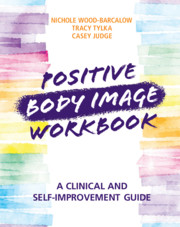Book contents
- Positive Body Image Workbook
- Positive Body Image Workbook
- Copyright page
- Contents
- Foreword
- Acknowledgments
- Section I Introduction and Preparation
- Section II The Journey Toward Positive Body Image
- Chapter 4 Appearance Ideals and Media Literacy
- Chapter 5 Weight Stigma versus Weight Inclusivity
- Chapter 6 Body Acceptance by Others
- Chapter 7 Defining Beauty and Cultural Pride
- Chapter 8 Self-Compassion and Body Image Flexibility
- Chapter 9 Approaching Our Bodies
- Chapter 10 Body Appreciation
- Chapter 11 Functionality Appreciation
- Chapter 12 Embodiment
- Chapter 13 Objectification and Self-Objectification
- Chapter 14 Sexual Intimacy
- Chapter 15 Social Comparison
- Chapter 16 Body Talk
- Chapter 17 Protective Filtering
- Chapter 18 Rippling Effect: Mentorship
- Chapter 19 Self-Care
- Chapter 20 Fueling Our Bodies
- Chapter 21 Life-Enhancing Movement
- Chapter 22 Adaptive Appearance Investment and Quality of Life
- Section III Continuing Our Journeys
- Index
- References
Chapter 10 - Body Appreciation
from Section II - The Journey Toward Positive Body Image
Published online by Cambridge University Press: 02 February 2021
- Positive Body Image Workbook
- Positive Body Image Workbook
- Copyright page
- Contents
- Foreword
- Acknowledgments
- Section I Introduction and Preparation
- Section II The Journey Toward Positive Body Image
- Chapter 4 Appearance Ideals and Media Literacy
- Chapter 5 Weight Stigma versus Weight Inclusivity
- Chapter 6 Body Acceptance by Others
- Chapter 7 Defining Beauty and Cultural Pride
- Chapter 8 Self-Compassion and Body Image Flexibility
- Chapter 9 Approaching Our Bodies
- Chapter 10 Body Appreciation
- Chapter 11 Functionality Appreciation
- Chapter 12 Embodiment
- Chapter 13 Objectification and Self-Objectification
- Chapter 14 Sexual Intimacy
- Chapter 15 Social Comparison
- Chapter 16 Body Talk
- Chapter 17 Protective Filtering
- Chapter 18 Rippling Effect: Mentorship
- Chapter 19 Self-Care
- Chapter 20 Fueling Our Bodies
- Chapter 21 Life-Enhancing Movement
- Chapter 22 Adaptive Appearance Investment and Quality of Life
- Section III Continuing Our Journeys
- Index
- References
Summary
What does it mean to appreciate our bodies? Appreciation is another word for gratitude. Gratitude is a general tendency to notice and be thankful for the positive aspects of life, and it is strongly connected to our physical health and emotional well-being [1]. That is, the more grateful we are, the healthier we are and the better we feel. Body appreciation is repeatedly noticing and being thankful for our bodies [2]. The more grateful we are toward our bodies, the better we feel.
- Type
- Chapter
- Information
- Positive Body Image WorkbookA Clinical and Self-Improvement Guide, pp. 147 - 155Publisher: Cambridge University PressPrint publication year: 2021



